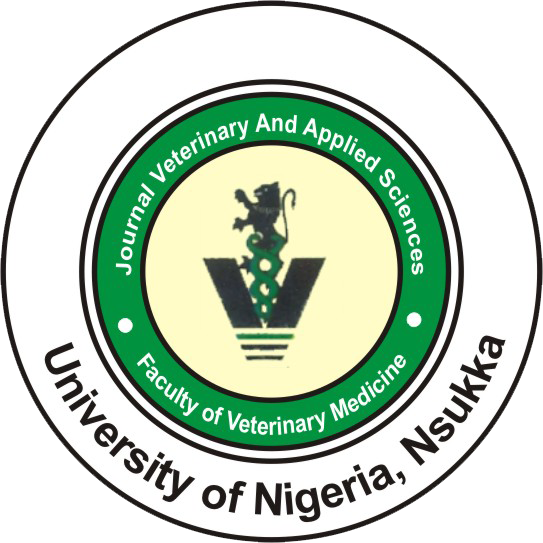University of Nigeria
ISSN: 2315 - 6856
e-ISSN: 2636 - 5553
Journal volumes
Powered by: RockSystems Global Services Ltd.
rocksystemsglobal@gmail.com (+2348035271306)
www.rocksystemsglobal.com
Volume 15, Issue 1: 2025 - Article 187
Abstract
Phytochemicals derived from some plants have been shown to possess anti-oxidant, anti-inflammatory, anti-bacterial, anti-cancer and anti-viral activity. Guava (Psidium guajava) leaf has been used in ethno-medicine to treat various ailments. This study evaluated the phytochemical constituents of methanol leaf extract of P. guajava and the toxicity/safety of the oral administration of the extract to albino rats. Phytochemical analysis of the extract and acute toxicity study followed standard procedures. Sixty albino rats weighing between 100 – 180 g were used for the study. Twenty eight of the rats were used for acute toxicity testing. The remaining 32 rats (made up of 16 males and 16 females) were randomly assigned to four groups. The 16 males were assigned to four groups (M1, M2, M3 and M4), while the 16 females were also assigned to four groups (F1, F2, F3 and F4). Groups M1 and F1 were the untreated control. Treatment was done through the oral route. The control group in each gender was treated with 2ml/kg body weight of distilled water while the remaining three groups (M2, M3 M4 and F2, F3, F4) were treated with graded doses (200mg/kg, 400mg/kg and 800mg/kg) of the guava leaf extract (GLE), respectively. Treatment lasted for 30 days. At day 31, blood was collected from the rats and the serum derived from the blood sample was used in biochemical assay of liver and kidney function markers and assay of serum lipid profile. Results of the phytochemical analysis showed that P. guajava extract contains a high level (+++) of flavonoids and phenols, moderate levels (++) of saponins and alkaloids, and low levels (+) of steroids, terpenoids, glycosides and tannins. Acute toxicity study yielded an oral LD50 of 4161.28 mg/kg for the extract in rats. Results of biochemical analysis showed that GLE administration led to significantly (p < 0.05) lower serum levels of cholesterol, LDL-C and significantly (p < 0.05) high HDL-C in some of the treated groups when compared to the untreated control, but there were no significant effects on serum biochemical markers of liver and kidney function.
Keywords: Phytochemicals analysis; Psidium guajava; Guava; Methanol extract; Toxicity/Safety; Liver and Kidney function; Lipid profile.
How to cite this article:
Nwankudu ON, Agbo FN and Chiemela VN (2025). Evaluation of the phytochemical composition of Psidium guajava (guava) methanol leaf extract and the effects of its oral administration on some serum biochemical markers of liver and kidney function in albino rats. Journal of Veterinary and Applied Sciences, 15(1): 1026 – 1034.
*Correspondence: E-mail: droluchi123@gmail.com Phone: +2347035294923

Evaluation of the phytochemical composition of Psidium guajava (guava) methanol leaf extract and the effects of its oral administration on some serum biochemical markers of liver and kidney function in albino rats
Oluchi N. Nwankudu 1 *, Francis N. Agbo 1 and Victoria N. Chiemela 2
1 Department of Veterinary Physiology and Pharmacology, College of Veterinary Medicine, Michael Okpara University of Agriculture, Umudike, Abia State, Nigeria.
2. Department of Agricultural Extension, Faculty of Agriculture, University of Nigeria, Nsukka, Enugu State, Nigeria.
Download .pdf copy here >>






